Analyzing Punishment: Gender Differences in Traditional Societies Now
VerifiedAdded on 2023/06/18
|11
|2506
|346
Essay
AI Summary
This essay examines the historical evolution of punishment, focusing on the differing criteria applied to men and women in traditional and modern societies. It begins by outlining the concept of punishment and its purpose in maintaining social order, then delves into specific examples from 17th-century England and the convict era, highlighting instances of unfair treatment towards women. The analysis extends to modern times, assessing the impact of reforms on gender equality in punishment. The essay also considers arguments for and against differential treatment, particularly in cases of similar crimes, ultimately concluding that while vulnerabilities may warrant some distinctions, equality and human rights should be paramount. The study concludes that punishment has continuously changed with the reduction of cruelty from punishment from the 17th century to the modern era. Desklib provides access to similar essays and solved assignments for students.
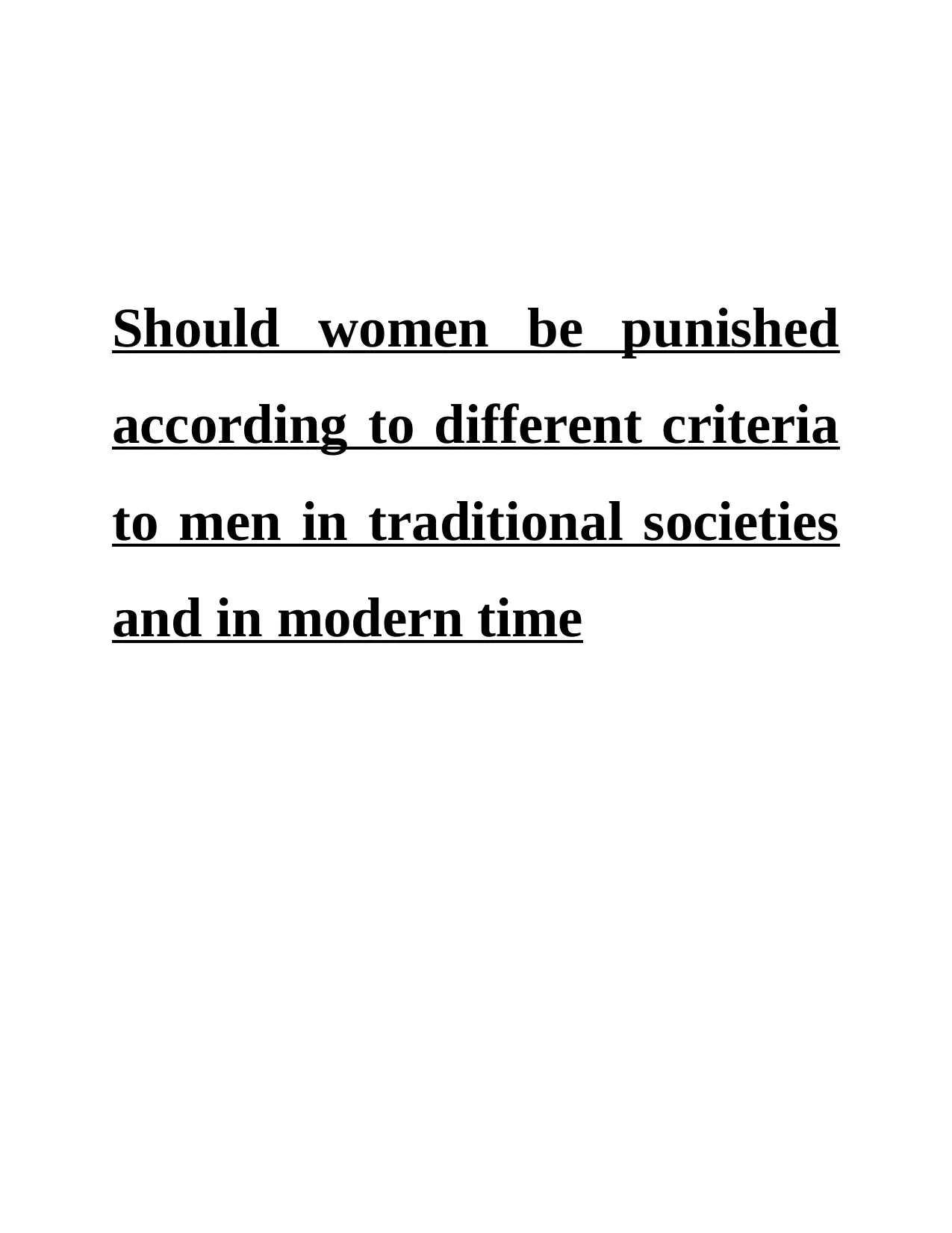
Should women be punished
according to different criteria
to men in traditional societies
and in modern time
according to different criteria
to men in traditional societies
and in modern time
Secure Best Marks with AI Grader
Need help grading? Try our AI Grader for instant feedback on your assignments.
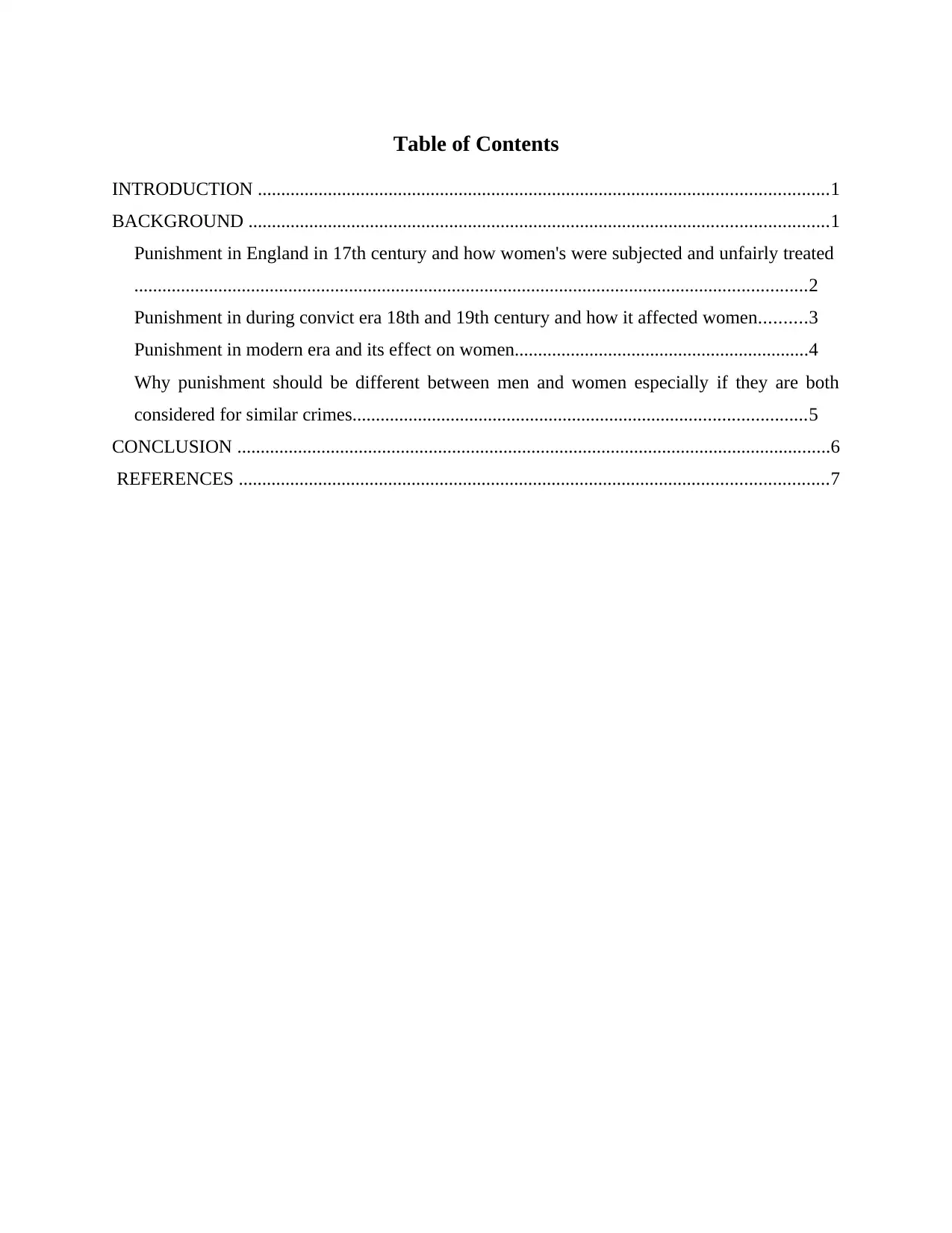
Table of Contents
INTRODUCTION ..........................................................................................................................1
BACKGROUND ............................................................................................................................1
Punishment in England in 17th century and how women's were subjected and unfairly treated
................................................................................................................................................2
Punishment in during convict era 18th and 19th century and how it affected women..........3
Punishment in modern era and its effect on women...............................................................4
Why punishment should be different between men and women especially if they are both
considered for similar crimes.................................................................................................5
CONCLUSION ...............................................................................................................................6
REFERENCES ..............................................................................................................................7
INTRODUCTION ..........................................................................................................................1
BACKGROUND ............................................................................................................................1
Punishment in England in 17th century and how women's were subjected and unfairly treated
................................................................................................................................................2
Punishment in during convict era 18th and 19th century and how it affected women..........3
Punishment in modern era and its effect on women...............................................................4
Why punishment should be different between men and women especially if they are both
considered for similar crimes.................................................................................................5
CONCLUSION ...............................................................................................................................6
REFERENCES ..............................................................................................................................7
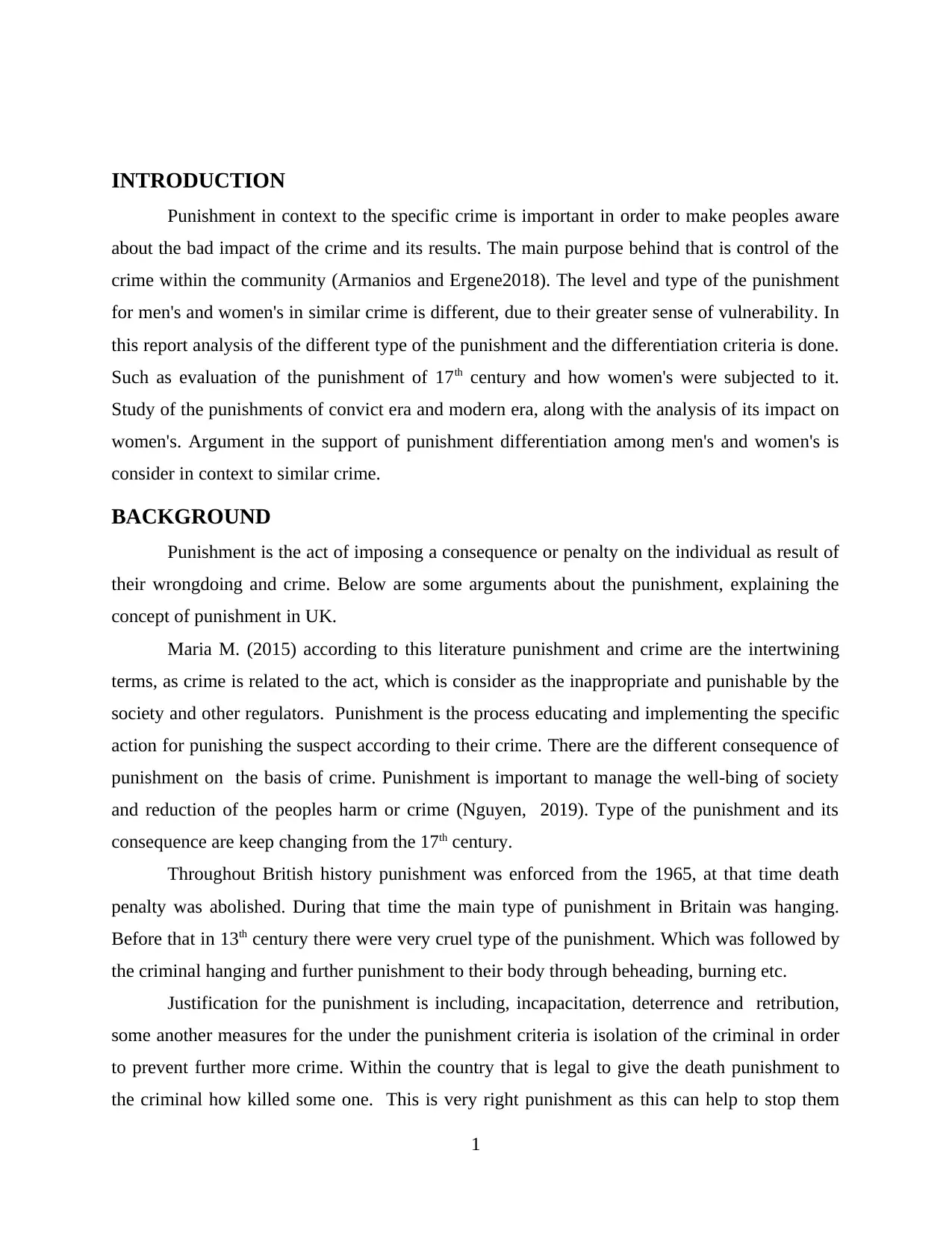
INTRODUCTION
Punishment in context to the specific crime is important in order to make peoples aware
about the bad impact of the crime and its results. The main purpose behind that is control of the
crime within the community (Armanios and Ergene2018). The level and type of the punishment
for men's and women's in similar crime is different, due to their greater sense of vulnerability. In
this report analysis of the different type of the punishment and the differentiation criteria is done.
Such as evaluation of the punishment of 17th century and how women's were subjected to it.
Study of the punishments of convict era and modern era, along with the analysis of its impact on
women's. Argument in the support of punishment differentiation among men's and women's is
consider in context to similar crime.
BACKGROUND
Punishment is the act of imposing a consequence or penalty on the individual as result of
their wrongdoing and crime. Below are some arguments about the punishment, explaining the
concept of punishment in UK.
Maria M. (2015) according to this literature punishment and crime are the intertwining
terms, as crime is related to the act, which is consider as the inappropriate and punishable by the
society and other regulators. Punishment is the process educating and implementing the specific
action for punishing the suspect according to their crime. There are the different consequence of
punishment on the basis of crime. Punishment is important to manage the well-bing of society
and reduction of the peoples harm or crime (Nguyen, 2019). Type of the punishment and its
consequence are keep changing from the 17th century.
Throughout British history punishment was enforced from the 1965, at that time death
penalty was abolished. During that time the main type of punishment in Britain was hanging.
Before that in 13th century there were very cruel type of the punishment. Which was followed by
the criminal hanging and further punishment to their body through beheading, burning etc.
Justification for the punishment is including, incapacitation, deterrence and retribution,
some another measures for the under the punishment criteria is isolation of the criminal in order
to prevent further more crime. Within the country that is legal to give the death punishment to
the criminal how killed some one. This is very right punishment as this can help to stop them
1
Punishment in context to the specific crime is important in order to make peoples aware
about the bad impact of the crime and its results. The main purpose behind that is control of the
crime within the community (Armanios and Ergene2018). The level and type of the punishment
for men's and women's in similar crime is different, due to their greater sense of vulnerability. In
this report analysis of the different type of the punishment and the differentiation criteria is done.
Such as evaluation of the punishment of 17th century and how women's were subjected to it.
Study of the punishments of convict era and modern era, along with the analysis of its impact on
women's. Argument in the support of punishment differentiation among men's and women's is
consider in context to similar crime.
BACKGROUND
Punishment is the act of imposing a consequence or penalty on the individual as result of
their wrongdoing and crime. Below are some arguments about the punishment, explaining the
concept of punishment in UK.
Maria M. (2015) according to this literature punishment and crime are the intertwining
terms, as crime is related to the act, which is consider as the inappropriate and punishable by the
society and other regulators. Punishment is the process educating and implementing the specific
action for punishing the suspect according to their crime. There are the different consequence of
punishment on the basis of crime. Punishment is important to manage the well-bing of society
and reduction of the peoples harm or crime (Nguyen, 2019). Type of the punishment and its
consequence are keep changing from the 17th century.
Throughout British history punishment was enforced from the 1965, at that time death
penalty was abolished. During that time the main type of punishment in Britain was hanging.
Before that in 13th century there were very cruel type of the punishment. Which was followed by
the criminal hanging and further punishment to their body through beheading, burning etc.
Justification for the punishment is including, incapacitation, deterrence and retribution,
some another measures for the under the punishment criteria is isolation of the criminal in order
to prevent further more crime. Within the country that is legal to give the death punishment to
the criminal how killed some one. This is very right punishment as this can help to stop them
1
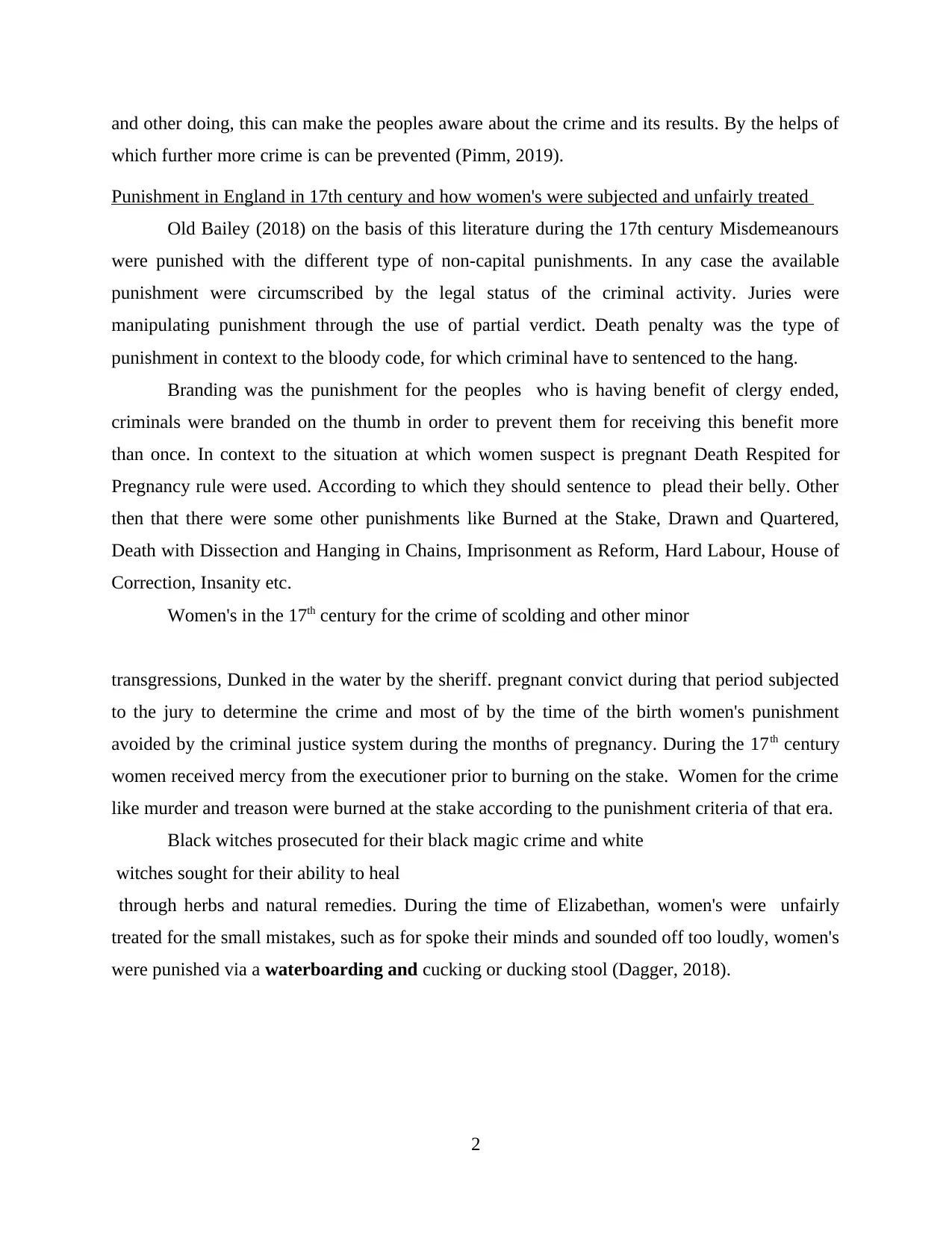
and other doing, this can make the peoples aware about the crime and its results. By the helps of
which further more crime is can be prevented (Pimm, 2019).
Punishment in England in 17th century and how women's were subjected and unfairly treated
Old Bailey (2018) on the basis of this literature during the 17th century Misdemeanours
were punished with the different type of non-capital punishments. In any case the available
punishment were circumscribed by the legal status of the criminal activity. Juries were
manipulating punishment through the use of partial verdict. Death penalty was the type of
punishment in context to the bloody code, for which criminal have to sentenced to the hang.
Branding was the punishment for the peoples who is having benefit of clergy ended,
criminals were branded on the thumb in order to prevent them for receiving this benefit more
than once. In context to the situation at which women suspect is pregnant Death Respited for
Pregnancy rule were used. According to which they should sentence to plead their belly. Other
then that there were some other punishments like Burned at the Stake, Drawn and Quartered,
Death with Dissection and Hanging in Chains, Imprisonment as Reform, Hard Labour, House of
Correction, Insanity etc.
Women's in the 17th century for the crime of scolding and other minor
transgressions, Dunked in the water by the sheriff. pregnant convict during that period subjected
to the jury to determine the crime and most of by the time of the birth women's punishment
avoided by the criminal justice system during the months of pregnancy. During the 17th century
women received mercy from the executioner prior to burning on the stake. Women for the crime
like murder and treason were burned at the stake according to the punishment criteria of that era.
Black witches prosecuted for their black magic crime and white
witches sought for their ability to heal
through herbs and natural remedies. During the time of Elizabethan, women's were unfairly
treated for the small mistakes, such as for spoke their minds and sounded off too loudly, women's
were punished via a waterboarding and cucking or ducking stool (Dagger, 2018).
2
which further more crime is can be prevented (Pimm, 2019).
Punishment in England in 17th century and how women's were subjected and unfairly treated
Old Bailey (2018) on the basis of this literature during the 17th century Misdemeanours
were punished with the different type of non-capital punishments. In any case the available
punishment were circumscribed by the legal status of the criminal activity. Juries were
manipulating punishment through the use of partial verdict. Death penalty was the type of
punishment in context to the bloody code, for which criminal have to sentenced to the hang.
Branding was the punishment for the peoples who is having benefit of clergy ended,
criminals were branded on the thumb in order to prevent them for receiving this benefit more
than once. In context to the situation at which women suspect is pregnant Death Respited for
Pregnancy rule were used. According to which they should sentence to plead their belly. Other
then that there were some other punishments like Burned at the Stake, Drawn and Quartered,
Death with Dissection and Hanging in Chains, Imprisonment as Reform, Hard Labour, House of
Correction, Insanity etc.
Women's in the 17th century for the crime of scolding and other minor
transgressions, Dunked in the water by the sheriff. pregnant convict during that period subjected
to the jury to determine the crime and most of by the time of the birth women's punishment
avoided by the criminal justice system during the months of pregnancy. During the 17th century
women received mercy from the executioner prior to burning on the stake. Women for the crime
like murder and treason were burned at the stake according to the punishment criteria of that era.
Black witches prosecuted for their black magic crime and white
witches sought for their ability to heal
through herbs and natural remedies. During the time of Elizabethan, women's were unfairly
treated for the small mistakes, such as for spoke their minds and sounded off too loudly, women's
were punished via a waterboarding and cucking or ducking stool (Dagger, 2018).
2
Secure Best Marks with AI Grader
Need help grading? Try our AI Grader for instant feedback on your assignments.
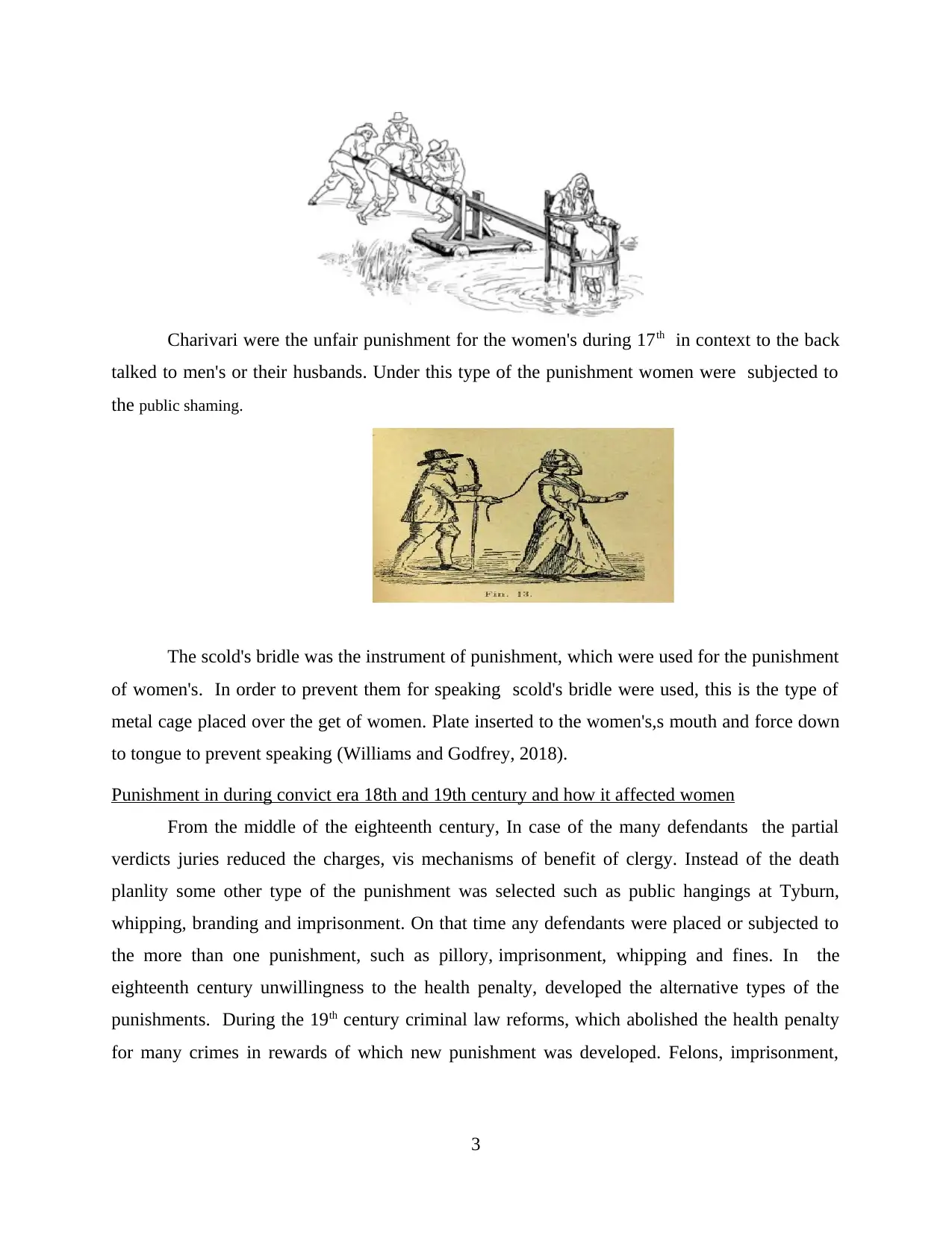
Charivari were the unfair punishment for the women's during 17th in context to the back
talked to men's or their husbands. Under this type of the punishment women were subjected to
the public shaming.
The scold's bridle was the instrument of punishment, which were used for the punishment
of women's. In order to prevent them for speaking scold's bridle were used, this is the type of
metal cage placed over the get of women. Plate inserted to the women's,s mouth and force down
to tongue to prevent speaking (Williams and Godfrey, 2018).
Punishment in during convict era 18th and 19th century and how it affected women
From the middle of the eighteenth century, In case of the many defendants the partial
verdicts juries reduced the charges, vis mechanisms of benefit of clergy. Instead of the death
planlity some other type of the punishment was selected such as public hangings at Tyburn,
whipping, branding and imprisonment. On that time any defendants were placed or subjected to
the more than one punishment, such as pillory, imprisonment, whipping and fines. In the
eighteenth century unwillingness to the health penalty, developed the alternative types of the
punishments. During the 19th century criminal law reforms, which abolished the health penalty
for many crimes in rewards of which new punishment was developed. Felons, imprisonment,
3
talked to men's or their husbands. Under this type of the punishment women were subjected to
the public shaming.
The scold's bridle was the instrument of punishment, which were used for the punishment
of women's. In order to prevent them for speaking scold's bridle were used, this is the type of
metal cage placed over the get of women. Plate inserted to the women's,s mouth and force down
to tongue to prevent speaking (Williams and Godfrey, 2018).
Punishment in during convict era 18th and 19th century and how it affected women
From the middle of the eighteenth century, In case of the many defendants the partial
verdicts juries reduced the charges, vis mechanisms of benefit of clergy. Instead of the death
planlity some other type of the punishment was selected such as public hangings at Tyburn,
whipping, branding and imprisonment. On that time any defendants were placed or subjected to
the more than one punishment, such as pillory, imprisonment, whipping and fines. In the
eighteenth century unwillingness to the health penalty, developed the alternative types of the
punishments. During the 19th century criminal law reforms, which abolished the health penalty
for many crimes in rewards of which new punishment was developed. Felons, imprisonment,
3
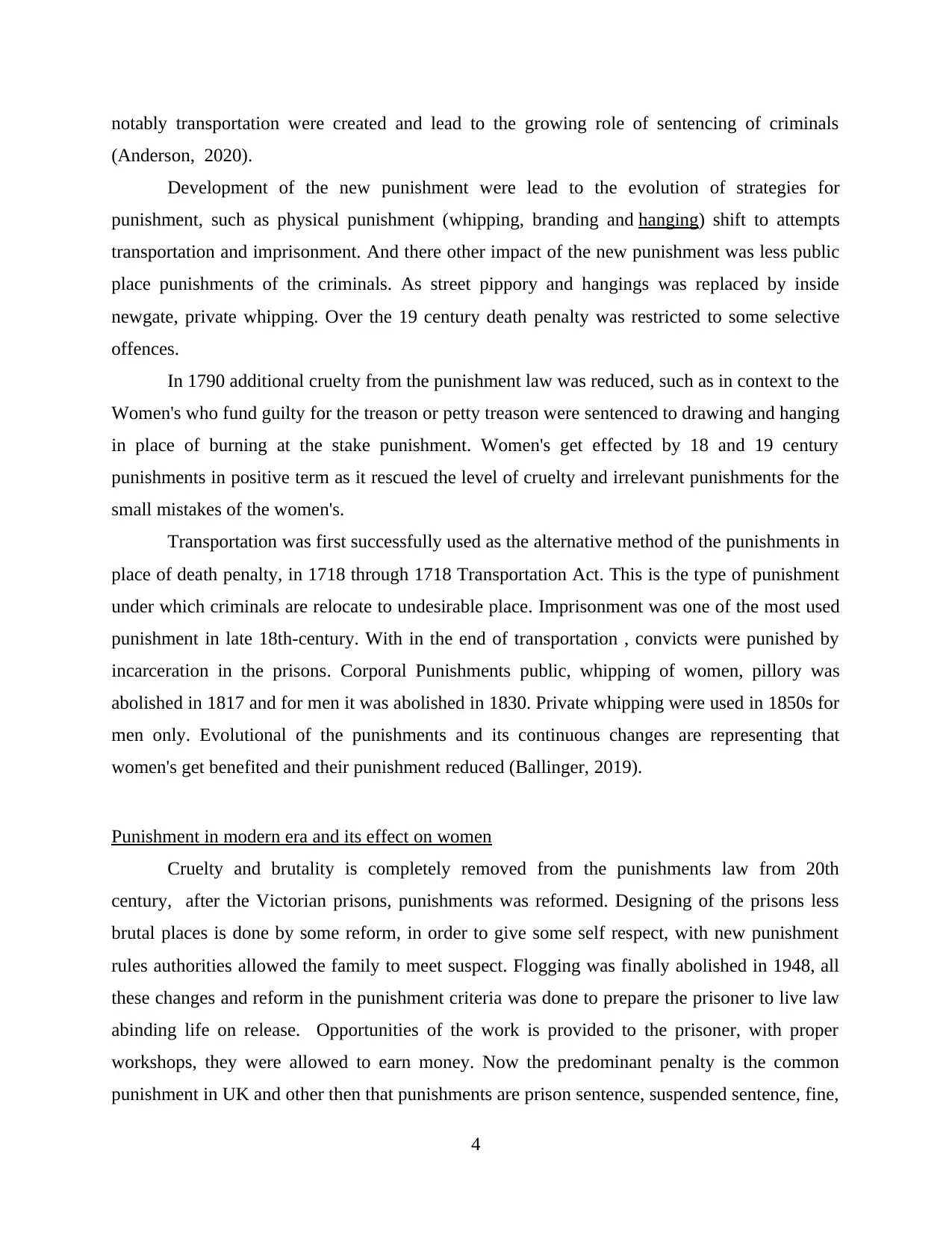
notably transportation were created and lead to the growing role of sentencing of criminals
(Anderson, 2020).
Development of the new punishment were lead to the evolution of strategies for
punishment, such as physical punishment (whipping, branding and hanging) shift to attempts
transportation and imprisonment. And there other impact of the new punishment was less public
place punishments of the criminals. As street pippory and hangings was replaced by inside
newgate, private whipping. Over the 19 century death penalty was restricted to some selective
offences.
In 1790 additional cruelty from the punishment law was reduced, such as in context to the
Women's who fund guilty for the treason or petty treason were sentenced to drawing and hanging
in place of burning at the stake punishment. Women's get effected by 18 and 19 century
punishments in positive term as it rescued the level of cruelty and irrelevant punishments for the
small mistakes of the women's.
Transportation was first successfully used as the alternative method of the punishments in
place of death penalty, in 1718 through 1718 Transportation Act. This is the type of punishment
under which criminals are relocate to undesirable place. Imprisonment was one of the most used
punishment in late 18th-century. With in the end of transportation , convicts were punished by
incarceration in the prisons. Corporal Punishments public, whipping of women, pillory was
abolished in 1817 and for men it was abolished in 1830. Private whipping were used in 1850s for
men only. Evolutional of the punishments and its continuous changes are representing that
women's get benefited and their punishment reduced (Ballinger, 2019).
Punishment in modern era and its effect on women
Cruelty and brutality is completely removed from the punishments law from 20th
century, after the Victorian prisons, punishments was reformed. Designing of the prisons less
brutal places is done by some reform, in order to give some self respect, with new punishment
rules authorities allowed the family to meet suspect. Flogging was finally abolished in 1948, all
these changes and reform in the punishment criteria was done to prepare the prisoner to live law
abinding life on release. Opportunities of the work is provided to the prisoner, with proper
workshops, they were allowed to earn money. Now the predominant penalty is the common
punishment in UK and other then that punishments are prison sentence, suspended sentence, fine,
4
(Anderson, 2020).
Development of the new punishment were lead to the evolution of strategies for
punishment, such as physical punishment (whipping, branding and hanging) shift to attempts
transportation and imprisonment. And there other impact of the new punishment was less public
place punishments of the criminals. As street pippory and hangings was replaced by inside
newgate, private whipping. Over the 19 century death penalty was restricted to some selective
offences.
In 1790 additional cruelty from the punishment law was reduced, such as in context to the
Women's who fund guilty for the treason or petty treason were sentenced to drawing and hanging
in place of burning at the stake punishment. Women's get effected by 18 and 19 century
punishments in positive term as it rescued the level of cruelty and irrelevant punishments for the
small mistakes of the women's.
Transportation was first successfully used as the alternative method of the punishments in
place of death penalty, in 1718 through 1718 Transportation Act. This is the type of punishment
under which criminals are relocate to undesirable place. Imprisonment was one of the most used
punishment in late 18th-century. With in the end of transportation , convicts were punished by
incarceration in the prisons. Corporal Punishments public, whipping of women, pillory was
abolished in 1817 and for men it was abolished in 1830. Private whipping were used in 1850s for
men only. Evolutional of the punishments and its continuous changes are representing that
women's get benefited and their punishment reduced (Ballinger, 2019).
Punishment in modern era and its effect on women
Cruelty and brutality is completely removed from the punishments law from 20th
century, after the Victorian prisons, punishments was reformed. Designing of the prisons less
brutal places is done by some reform, in order to give some self respect, with new punishment
rules authorities allowed the family to meet suspect. Flogging was finally abolished in 1948, all
these changes and reform in the punishment criteria was done to prepare the prisoner to live law
abinding life on release. Opportunities of the work is provided to the prisoner, with proper
workshops, they were allowed to earn money. Now the predominant penalty is the common
punishment in UK and other then that punishments are prison sentence, suspended sentence, fine,
4
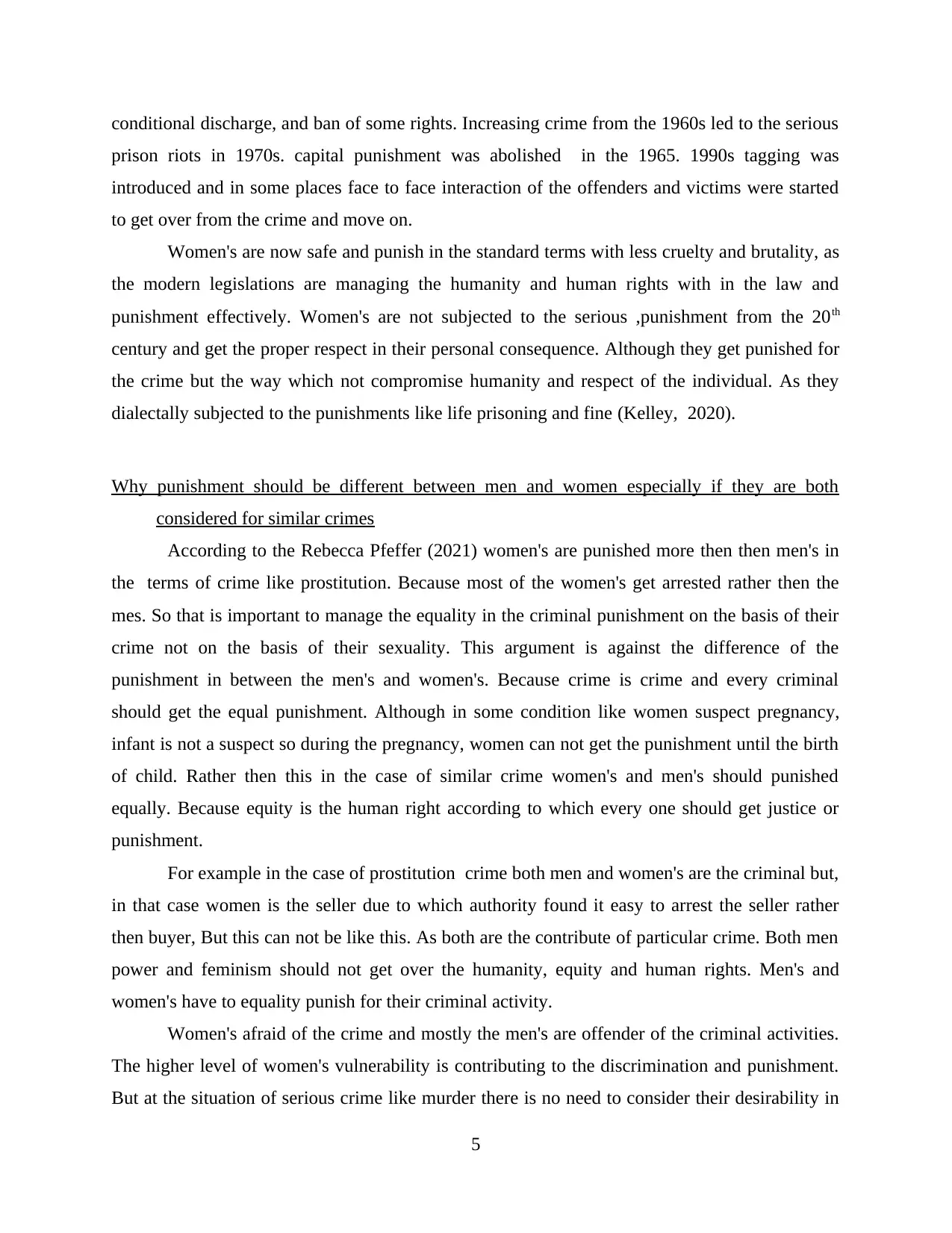
conditional discharge, and ban of some rights. Increasing crime from the 1960s led to the serious
prison riots in 1970s. capital punishment was abolished in the 1965. 1990s tagging was
introduced and in some places face to face interaction of the offenders and victims were started
to get over from the crime and move on.
Women's are now safe and punish in the standard terms with less cruelty and brutality, as
the modern legislations are managing the humanity and human rights with in the law and
punishment effectively. Women's are not subjected to the serious ,punishment from the 20th
century and get the proper respect in their personal consequence. Although they get punished for
the crime but the way which not compromise humanity and respect of the individual. As they
dialectally subjected to the punishments like life prisoning and fine (Kelley, 2020).
Why punishment should be different between men and women especially if they are both
considered for similar crimes
According to the Rebecca Pfeffer (2021) women's are punished more then then men's in
the terms of crime like prostitution. Because most of the women's get arrested rather then the
mes. So that is important to manage the equality in the criminal punishment on the basis of their
crime not on the basis of their sexuality. This argument is against the difference of the
punishment in between the men's and women's. Because crime is crime and every criminal
should get the equal punishment. Although in some condition like women suspect pregnancy,
infant is not a suspect so during the pregnancy, women can not get the punishment until the birth
of child. Rather then this in the case of similar crime women's and men's should punished
equally. Because equity is the human right according to which every one should get justice or
punishment.
For example in the case of prostitution crime both men and women's are the criminal but,
in that case women is the seller due to which authority found it easy to arrest the seller rather
then buyer, But this can not be like this. As both are the contribute of particular crime. Both men
power and feminism should not get over the humanity, equity and human rights. Men's and
women's have to equality punish for their criminal activity.
Women's afraid of the crime and mostly the men's are offender of the criminal activities.
The higher level of women's vulnerability is contributing to the discrimination and punishment.
But at the situation of serious crime like murder there is no need to consider their desirability in
5
prison riots in 1970s. capital punishment was abolished in the 1965. 1990s tagging was
introduced and in some places face to face interaction of the offenders and victims were started
to get over from the crime and move on.
Women's are now safe and punish in the standard terms with less cruelty and brutality, as
the modern legislations are managing the humanity and human rights with in the law and
punishment effectively. Women's are not subjected to the serious ,punishment from the 20th
century and get the proper respect in their personal consequence. Although they get punished for
the crime but the way which not compromise humanity and respect of the individual. As they
dialectally subjected to the punishments like life prisoning and fine (Kelley, 2020).
Why punishment should be different between men and women especially if they are both
considered for similar crimes
According to the Rebecca Pfeffer (2021) women's are punished more then then men's in
the terms of crime like prostitution. Because most of the women's get arrested rather then the
mes. So that is important to manage the equality in the criminal punishment on the basis of their
crime not on the basis of their sexuality. This argument is against the difference of the
punishment in between the men's and women's. Because crime is crime and every criminal
should get the equal punishment. Although in some condition like women suspect pregnancy,
infant is not a suspect so during the pregnancy, women can not get the punishment until the birth
of child. Rather then this in the case of similar crime women's and men's should punished
equally. Because equity is the human right according to which every one should get justice or
punishment.
For example in the case of prostitution crime both men and women's are the criminal but,
in that case women is the seller due to which authority found it easy to arrest the seller rather
then buyer, But this can not be like this. As both are the contribute of particular crime. Both men
power and feminism should not get over the humanity, equity and human rights. Men's and
women's have to equality punish for their criminal activity.
Women's afraid of the crime and mostly the men's are offender of the criminal activities.
The higher level of women's vulnerability is contributing to the discrimination and punishment.
But at the situation of serious crime like murder there is no need to consider their desirability in
5
Paraphrase This Document
Need a fresh take? Get an instant paraphrase of this document with our AI Paraphraser
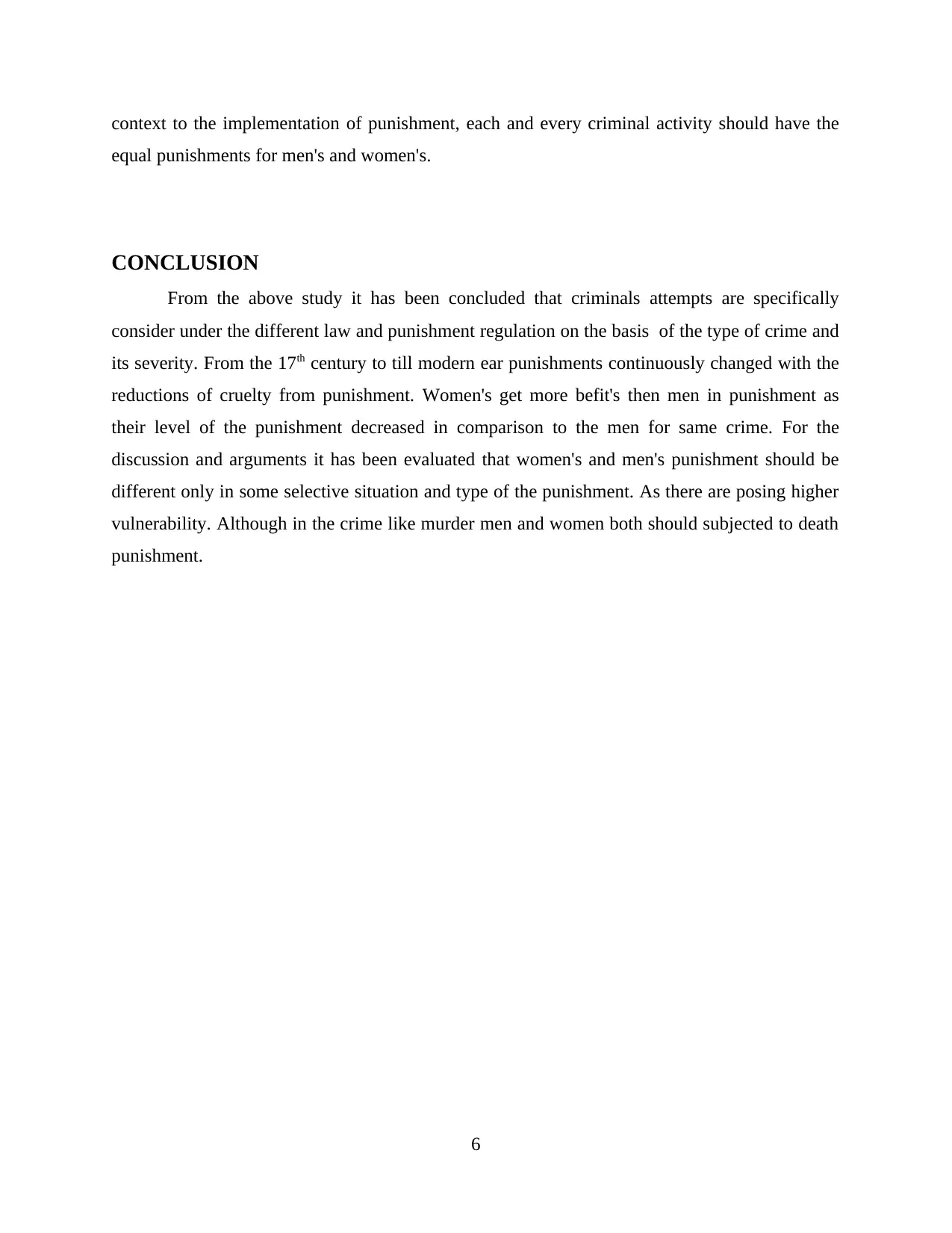
context to the implementation of punishment, each and every criminal activity should have the
equal punishments for men's and women's.
CONCLUSION
From the above study it has been concluded that criminals attempts are specifically
consider under the different law and punishment regulation on the basis of the type of crime and
its severity. From the 17th century to till modern ear punishments continuously changed with the
reductions of cruelty from punishment. Women's get more befit's then men in punishment as
their level of the punishment decreased in comparison to the men for same crime. For the
discussion and arguments it has been evaluated that women's and men's punishment should be
different only in some selective situation and type of the punishment. As there are posing higher
vulnerability. Although in the crime like murder men and women both should subjected to death
punishment.
6
equal punishments for men's and women's.
CONCLUSION
From the above study it has been concluded that criminals attempts are specifically
consider under the different law and punishment regulation on the basis of the type of crime and
its severity. From the 17th century to till modern ear punishments continuously changed with the
reductions of cruelty from punishment. Women's get more befit's then men in punishment as
their level of the punishment decreased in comparison to the men for same crime. For the
discussion and arguments it has been evaluated that women's and men's punishment should be
different only in some selective situation and type of the punishment. As there are posing higher
vulnerability. Although in the crime like murder men and women both should subjected to death
punishment.
6
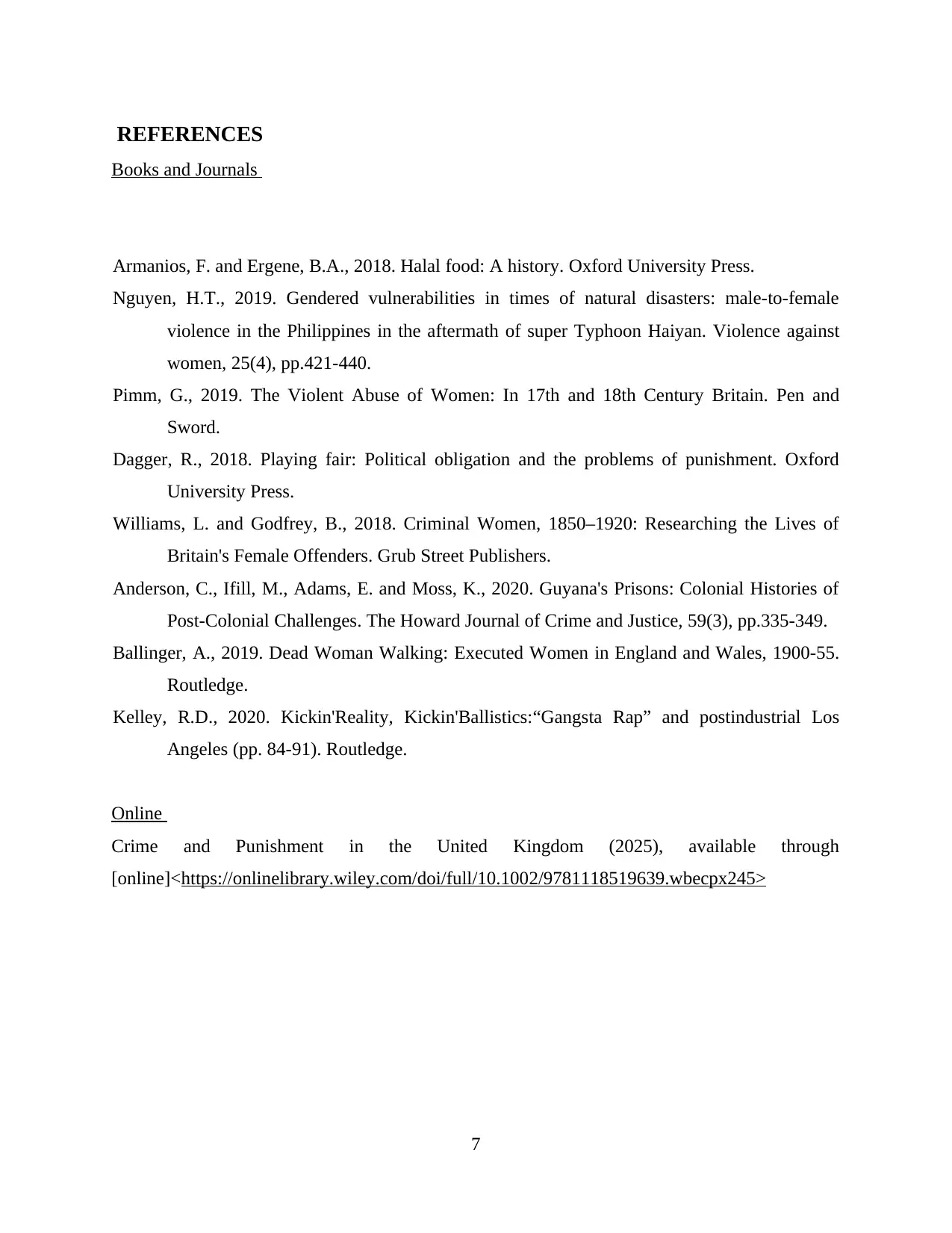
REFERENCES
Books and Journals
Armanios, F. and Ergene, B.A., 2018. Halal food: A history. Oxford University Press.
Nguyen, H.T., 2019. Gendered vulnerabilities in times of natural disasters: male-to-female
violence in the Philippines in the aftermath of super Typhoon Haiyan. Violence against
women, 25(4), pp.421-440.
Pimm, G., 2019. The Violent Abuse of Women: In 17th and 18th Century Britain. Pen and
Sword.
Dagger, R., 2018. Playing fair: Political obligation and the problems of punishment. Oxford
University Press.
Williams, L. and Godfrey, B., 2018. Criminal Women, 1850–1920: Researching the Lives of
Britain's Female Offenders. Grub Street Publishers.
Anderson, C., Ifill, M., Adams, E. and Moss, K., 2020. Guyana's Prisons: Colonial Histories of
Post‐Colonial Challenges. The Howard Journal of Crime and Justice, 59(3), pp.335-349.
Ballinger, A., 2019. Dead Woman Walking: Executed Women in England and Wales, 1900-55.
Routledge.
Kelley, R.D., 2020. Kickin'Reality, Kickin'Ballistics:“Gangsta Rap” and postindustrial Los
Angeles (pp. 84-91). Routledge.
Online
Crime and Punishment in the United Kingdom (2025), available through
[online]<https://onlinelibrary.wiley.com/doi/full/10.1002/9781118519639.wbecpx245>
7
Books and Journals
Armanios, F. and Ergene, B.A., 2018. Halal food: A history. Oxford University Press.
Nguyen, H.T., 2019. Gendered vulnerabilities in times of natural disasters: male-to-female
violence in the Philippines in the aftermath of super Typhoon Haiyan. Violence against
women, 25(4), pp.421-440.
Pimm, G., 2019. The Violent Abuse of Women: In 17th and 18th Century Britain. Pen and
Sword.
Dagger, R., 2018. Playing fair: Political obligation and the problems of punishment. Oxford
University Press.
Williams, L. and Godfrey, B., 2018. Criminal Women, 1850–1920: Researching the Lives of
Britain's Female Offenders. Grub Street Publishers.
Anderson, C., Ifill, M., Adams, E. and Moss, K., 2020. Guyana's Prisons: Colonial Histories of
Post‐Colonial Challenges. The Howard Journal of Crime and Justice, 59(3), pp.335-349.
Ballinger, A., 2019. Dead Woman Walking: Executed Women in England and Wales, 1900-55.
Routledge.
Kelley, R.D., 2020. Kickin'Reality, Kickin'Ballistics:“Gangsta Rap” and postindustrial Los
Angeles (pp. 84-91). Routledge.
Online
Crime and Punishment in the United Kingdom (2025), available through
[online]<https://onlinelibrary.wiley.com/doi/full/10.1002/9781118519639.wbecpx245>
7

8
Secure Best Marks with AI Grader
Need help grading? Try our AI Grader for instant feedback on your assignments.

9
1 out of 11
Related Documents
Your All-in-One AI-Powered Toolkit for Academic Success.
+13062052269
info@desklib.com
Available 24*7 on WhatsApp / Email
![[object Object]](/_next/static/media/star-bottom.7253800d.svg)
Unlock your academic potential
© 2024 | Zucol Services PVT LTD | All rights reserved.





